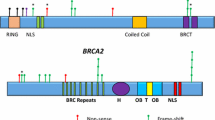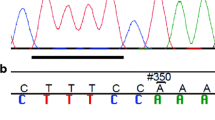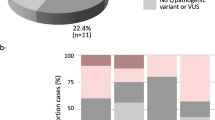Abstract
Cowden syndrome is a disease associated with an increase in breast cancer susceptibility. Alleles in PTEN and other breast cancer susceptibility genes would be responsible for ∼25% of the familial component of breast cancer risk, BRCA1 and BRCA2 being the two major genes responsible for this inherited risk. In order to evaluate the proportion of high-risk French Canadian non-BRCA1/BRCA2 breast/ovarian cancer families potentially harboring a PTEN germline mutation, the whole coding and flanking intronic sequences were analyzed in a series of 98 breast cancer cases. Although no germline mutation has been identified in the coding region, our study led to the identification of four intronic variants. Further investigations were performed to analyze the effect of these variants, alone and/or in combination, on splicing and PTEN protein levels. Despite suggestive evidence emerging from in silico analyses, the presence of these intronic variants do not seem to alter RNA splicing or PTEN protein levels. In addition, as loss of PTEN or part of it has been reported, Western blot analysis has also been performed. No major deletion could be identified in our cohort. Therefore, assuming a Poisson distribution for the frequency of deleterious mutation in our cohort, if the frequency of such deleterious mutation was 2%, we would have had a 90% or greater chance of observing at least one such mutation. These results suggest that PTEN germline mutations are rare and are unlikely to account for a significant proportion of familial breast cancer cases in the French Canadian population.


Similar content being viewed by others
Abbreviations
- BRRS:
-
Bannayan-Riley-Ruvalcaba syndrome
- CD:
-
Cowden disease
- Dr :
-
Dario rerio
- EBV:
-
Epstein-Barr virus
- EST:
-
Expressed sequence tag
- Gg :
-
Gallus gallus
- Hs :
-
Homo sapiens
- MAF:
-
Minor allele frequency
- Md :
-
Monodelphis domestica
- Mm :
-
Mus musculus
- PDZ:
-
PSD-95/Dlg/ZO-1 domain
- PEST:
-
Proline, glutamic acid, serine, and threonine domain
- Pt :
-
Pan troglodytes
- RPA:
-
Ribonuclease protection assay
- Tr :
-
Takifugu rubripes
- WT:
-
Wild type
References
Collaborative Group on Hormonal Factors in Breast Cancer (2001) Familial breast cancer: collaborative reanalysis of individual data from 52 epidemiological studies including 58,209 women with breast cancer and 101,986 women without the disease. Lancet 358(9291):1389–1399
Ford D, Easton DF, Stratton M et al (1998) Genetic heterogeneity and penetrance analysis of the BRCA1 and BRCA2 genes in breast cancer families. The Breast Cancer Linkage Consortium. Am J Hum Genet 62(3):676–689
Antoniou A, Pharoah PD, Narod S et al (2003) Average risks of breast and ovarian cancer associated with BRCA1 or BRCA2 mutations detected in case Series unselected for family history: a combined analysis of 22 studies. Am J Hum Genet 72(5):1117–1130
CHEK2 Breast Cancer Case-Control Consortium (2004) CHEK2*1100delC and susceptibility to breast cancer: a collaborative analysis involving 10,860 breast cancer cases and 9,065 controls from 10 studies. Am J Hum Genet. 74(6):1175–1182
Seal S, Thompson D, Renwick A et al (2006) Truncating mutations in the Fanconi anemia J gene BRIP1 are low-penetrance breast cancer susceptibility alleles. Nat Genet 38(11):1239–1241
Ball S, Arolker M, Purushotham AD (2001) Breast cancer, Cowden disease and PTEN-MATCHS syndrome. Eur J Surg Oncol 27(6):604–606
Lynch ED, Ostermeyer EA, Lee MK et al (1997) Inherited mutations in PTEN that are associated with breast cancer, cowden disease, and juvenile polyposis. Am J Hum Genet 61(6):1254–1260
Mercapide J, Zhang SY, Fan X et al (2002) CCND1- and ERBB2-gene deregulation and PTEN mutation analyses in invasive lobular carcinoma of the breast. Mol Carcinog 35(1):6–12
Figer A, Kaplan A, Frydman M et al (2002) Germline mutations in the PTEN gene in Israeli patients with Bannayan-Riley-Ruvalcaba syndrome and women with familial breast cancer. Clin Genet 62(4):298–302
Kurose K, Gilley K, Matsumoto S et al (2002) Frequent somatic mutations in PTEN and TP53 are mutually exclusive in the stroma of breast carcinomas. Nat Genet 32(3):355–357
Shugart YY, Cour C, Renard H et al (1999) Linkage analysis of 56 multiplex families excludes the Cowden disease gene PTEN as a major contributor to familial breast cancer. J Med Genet 36(9):720–721
Haiman CA, Stram DO, Cheng I et al (2006) Common genetic variation at PTEN and risk of sporadic breast and prostate cancer. Cancer Epidemiol Biomarkers Prev 15(5):1021–1025
Carroll BT, Couch FJ, Rebbeck TR et al (1999) Polymorphisms in PTEN in breast cancer families. J Med Genet 36(2):94–96. Erratum in: J Med Genet 2000, 37(7):559
Durocher F, Guénard F, Desjardins S et al (2005) Inherited susceptibility to breast cancer: accomplishments and challenges. In: Sinnett D (eds) Molecular genetics of cancer. Research Signpost, Kerala
Simard J, Dumont M, Moisan AM et al (2007) Evaluation of BRCA1 and BRCA2 mutation prevalence, risk prediction models and a multi-step testing approach in French-Canadian high-risk breast and ovarian cancer families. J Med Genet 44(2):107–121
Vezina H, Durocher F, Dumont M et al (2005) Molecular and genealogical characterization of the R1443X BRCA1 mutation in high-risk French-Canadian breast/ovarian cancer families. Hum Genet 117(2–3):119–132
Durocher F, Labrie Y, Soucy P et al (2006) Mutation analysis and characterization of ATR sequence variants in breast cancer cases from high-risk French Canadian Breast/Ovarian Cancer Families. BMC Cancer 6:230
Rhei E, Kang L, Bogomolniy F et al (1997) Mutation analysis of the putative tumor suppressor gene PTEN/MMAC1 in primary breast carcinomas. Cancer Res 57(17):3657–3659
Teng DH, Hu R, Lin H et al (1997) MMAC1/PTEN mutations in primary tumor specimens and tumor cell lines. Cancer Res 57(23):5221–5225
Weng LP, Smith WM, Dahia PL et al (1999) PTEN suppresses breast cancer cell growth by phosphatase activity-dependent G1 arrest followed by cell death. Cancer Res 59(22):5808–5814
Chenna R, Sugawara H, Koike T et al (2003) Multiple sequence alignment with the Clustal series of programs. Nucleic Acids Res 31(13):3497–3500
Pertea M, Lin X, Salzberg SL (2001) GeneSplicer: a new computational method for splice site prediction. Nucleic Acids Res 29(5):1185–1190
Shapiro MB, Senapathy P (1987) RNA splice junctions of different classes of eukaryotes: sequence statistics and functional implications in gene expression. Nucleic Acids Res 15(17):7155–7174
Senapathy P, Shapiro MB, Harris NL (1990) Splice junctions, branch point sites, and exons: sequence statistics, identification, and applications to genome project. Methods Enzymol 183:252–278
Reese MG, Eeckman FH, Kulp D et al (1997) Improved splice site detection in Genie. J Comput Biol 4(3):311–323
Pagani F, Baralle FE (2004) Genomic variants in exons and introns: identifying the splicing spoilers. Nat Rev Genet 5(5):389–396
Lim LP, Burge CB (2001) A computational analysis of sequence features involved in recognition of short introns. Proc Natl Acad Sci USA 98(20):11193–11198
Perren A, Weng LP, Boag AH et al (1999) Immunohistochemical evidence of loss of PTEN expression in primary ductal adenocarcinomas of the breast. Am J Pathol 155(4):1253–1260
Depowski PL, Rosenthal SI, Ross JS (2001) Loss of expression of the PTEN gene protein product is associated with poor outcome in breast cancer. Mod Pathol 14(7):672–676
Bose S, Wang SI, Terry MB et al (1998) Allelic loss of chromosome 10q23 is associated with tumor progression in breast carcinomas. Oncogene 17(1):123–127
Chen ST, Yu SY, Tsai M et al (1999) Mutation analysis of the putative tumor suppression gene PTEN/MMAC1 in sporadic breast cancer. Breast Cancer Res Treat 55(1):85–89
Olschwang S, Serova-Sinilnikova OM, Lenoir GM et al (1998) PTEN germ-line mutations in juvenile polyposis coli. Nat Genet 18(1):12–14
Nassif NT, Lobo GP, Wu X et al (2004) PTEN mutations are common in sporadic microsatellite stable colorectal cancer. Oncogene 23(2):617–628
Agrawal S, Pilarski R, Eng C (2005) Different splicing defects lead to differential effects downstream of the lipid and protein phosphatase activities of PTEN. Hum Mol Genet 14(16):2459–2468
Hamilton JA, Stewart LM, Ajayi L et al (2000) The expression profile for the tumour suppressor gene PTEN and associated polymorphic markers. Br J Cancer 82(10):1671–1676
Kong D, Suzuki A, Zou TT et al (1997) PTEN1 is frequently mutated in primary endometrial carcinomas. Nat Genet 17(2):143–144
Sakurada A, Suzuki A, Sato M et al (1997) Infrequent genetic alterations of the PTEN/MMAC1 gene in Japanese patients with primary cancers of the breast, lung, pancreas, kidney, and ovary. Jpn J Cancer Res 88(11):1025–1028
Acknowledgments
The authors are indebted to the participants and their families for their generosity and providing DNA samples. We would like to thank Dr Martine Dumont, Gilles Leblanc, Carolle Samson and Martine Tranchant for sample management, mutation screening, and skillful technical assistance as well as Claire Brousseau, Marie-Andrée Lajoie, Pascale Léger, Hélène Malouin and Josée Rhéaume, for genetic counselling and clinical data management at the Cancer Genomics Laboratory. We thank Anne-Marie Moisan and Lucie Larouche for MLPA analyses. A special thank to Mélanie Houde for skillful laboratory assistance. We also appreciate advice received from ethics committees. This work was supported by the Canadian Institutes of Health Research (CIHR) and Institute of Cancer and Institute of Gender and Health for the INHERIT BRCAs research program, the Fonds de la Recherche en Santé du Québec (FRSQ)/Réseau de Médecine Génétique Appliquée (RMGA), the Canadian Breast Cancer Research Alliance and the CURE Foundation. F. G. is recipient of a studentship from Fondation René Bussières, and F. D. is a recipient of a Research Career Award in the Health Sciences from CIHR/Rx&D Health Research Foundation.
Author information
Authors and Affiliations
Consortia
Corresponding author
Additional information
Other members of INHERIT BRCAs involved in this study are listed in Appendix 1.
Electronic supplementary material
Below is the link to the electronic supplementary material.
Appendix 1
Appendix 1
Peter Bridge, Molecular Diagnostic Laboratory, Alberta Children’s Hospital, Calgary, Canada.
Yann Joly, Centre de recherche en droit public, Montreal University, Montreal, Canada.
Bartha Maria Knopper, Chaire de recherche en droit et médecine, Centre de recherche en droit public, Montreal University, Montreal, Canada.
Jacques Simard, Canada Research Chair in Oncogenetics, Cancer Genomics Laboratory, Oncology and Molecular Endocrinology Research Centre, CHUQ, Pavillon CHUL and Laval University, Québec, Canada.
Rights and permissions
About this article
Cite this article
Guénard, F., Labrie, Y., Ouellette, G. et al. Germline mutations in the breast cancer susceptibility gene PTEN are rare in high-risk non-BRCA1/2 French Canadian breast cancer families. Familial Cancer 6, 483–490 (2007). https://doi.org/10.1007/s10689-007-9151-y
Received:
Accepted:
Published:
Issue Date:
DOI: https://doi.org/10.1007/s10689-007-9151-y




